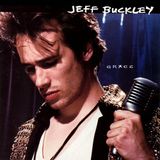"Grace is what matters in anything"
"It keeps you from reaching for the gun too quickly, it keeps you from destroying things to foolishly. It sort of keeps you alive and keeps you open for more understanding," the American songwriter said in 1994.
Jeff Buckley often ruminated about the central guiding force in his life and his art. As impassioned as he was about music, he also wrestled with the tension and conflict that came with it.
The music media's focus on his connection with his estranged father Tim Buckley and the hype that was building around him as a new artist, created a heightened air of expectation ahead of the release of his debut album.
He'd honed his live chops at Sin-e, a New York City café, were he had a residency in the early 90s.
The singer had a broad repertoire of songs he enjoyed covering, a few of his own original songs, including 'Mojo Pin' and the title track written with songwriter Gary Lucas, and no band (other than bassist Mick Grondahl).
The process of putting together his first full length lacked focus and flow and was proving to be a frustrating affair.
It was with the arrival of drummer Matt Johnson and guitarist Michael Tighe that songs like 'Dream Brother' and 'So Real' were developed, giving Buckley a sense of a fuller artistic work coming together.
When Grace was released in August 1994 it was a moderate success in the US, but Australian audiences latched on straight away. The singer songwriter would tour here twice before his untimely death in 1997.
From the decade that gave us grunge and gangsta rap, big beat and britpop, Grace stood apart from the big personalities and bombastic sounds of the era as a work of great beauty and passion, sadness and longing, and for its transcendent, enduring quality of grace.
